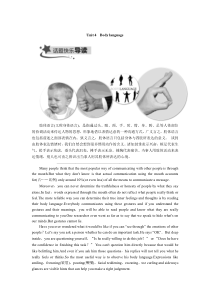 DOC
DOC
【文档说明】2019-2020学年人教新课标版高中英语必修四教学案:Unit+4+Body+language4-1Part+Ⅰ+含答案.docx,共(22)页,1.456 MB,由envi的店铺上传
转载请保留链接:https://www.doc5u.com/view-bf8c0251919382c66a3eaea27f011b58.html
以下为本文档部分文字说明:
Unit4Bodylanguage肢体语言(又称身体语言),是指通过头、眼、颈、手、肘、臂、身、胯、足等人体部位的协调活动来传达人物的思想,形象地借以表情达意的一种沟通方式。广义言之,肢体语言也包括前述之面部表情在内;狭义
言之,肢体语言只包括身体与四肢所表达的意义。谈到由肢体表达情绪时,我们自然会想到很多惯用动作的含义。诸如鼓掌表示兴奋,顿足代表生气,搓手表示焦虑,垂头代表沮丧,摊手表示无奈,捶胸代表痛苦。当事人用肢体活动来表达情绪,别人也可由之辨识出当事人用其肢体所表达的心境。——————————
——————————————————Manypeoplethinkthatthemostpopularwayofcommunicatingwithotherpeopleisthroughthemouth.Butwhattheydon'tknowisthatactualcommunica
tionusingthemouthaccountsfor(占……比例)onlyaround10%(orevenless)ofallthemeanstocommunicateamessage.Moreover,youcanneverdeterminethetru
thfulnessorhonestyofpeoplebywhattheysayalone.Infact,wordsexpressedthroughthemouthoftendonotreflectwhatpeoplereallythinkorfeel.Themorereliablewayy
oucandeterminetheirtrueinnerfeelingsandthoughtsisbyreadingtheirbodylanguage.Everybodycommunicatesusingthesegestur
esandifyouunderstandthegesturesandtheirmeanings,youwillbeabletoreadpeopleandknowwhattheyarereallycommunicatingtoyou.Oneresearcherevenwentasfarast
osaythatwespeaktohidewhat'sonourminds.Butgesturescannotlie.Haveyoueverwonderedwhatitwouldbelikeifyoucan“seethrough”theemotio
nsofotherpeople?Let'ssayyouaskapersonwhetherhecandoanimportanttask.Hesays“OK”.Butdeepinside,youarequestioning
yourself,“Ishereallywillingtodothisjob?”or“Doeshehavetheconfidenceinfinishingthistask?”Youcan'tquestion
himdirectlybecausethatwouldbelikebelittlinghim.Andevenifyouaskhimthosequestions,hisreplieswillnottellyo
uwhathereallyfeelsorthinks.Sothemostusefulwayistoobservehisbodylanguage.Expressionslikesmiling,frowning(皱眉)
,pouting(噘嘴),facialreddening,sweating,toecurlingandsidewaysglancesarevisiblehintsthatcanhelpyoumakearightjudgement.根据文章内容判断正(T)误(F
)。1.Manypeoplethinkthatthemostpopularwayofcommunicatingwithotherpeopleisthroughthehands.()2.Wordsexpressedthr
oughthemouthoftendonotreflectwhatpeoplereallythinkorfeel.()3.Themorereliablewayyoucandeterminetheirtrueinnerfeelingsandthoughtsisbyreadingthe
irbodylanguage.()4.Gesturescanlie.()5.Expressionslikesmiling,frowning,pouting,facialreddening,sweating,toecurlingandsidew
aysglancesarevisiblehintsthatcanhelpyoumakearightjudgement.()[答案]1.F2.T3.T4.F5.TPartⅠWarmingup,Prereading,Reading&ComprehendingⅠ.
重点单词1.____________vi.&vt.迎接;问候2.____________vt.代表;象征3.____________n.宿舍4.____________n.食堂5.____________n.飞行;航班6.____________vt.&vi.接近;靠近;走近n.接
近;方法;途径7.____________n.面颊8.____________vi.猛冲;突进9.____________n.成年人;成人adj.成人的;成熟的10.____________adj.可能的11.____________n.十字路口[答案]1.
greet2.represent3.dormitory4.canteen5.flight6.approach7.cheek8.dash9.adult10.likely11.crossroadsⅡ.词汇拓展1.__________n.陈述;说明→__________vt.陈述;说明2._____
_______n.社团;联系;联想→__________vt.结交;联合3.__________adj.好奇的→__________adv.好奇地→__________n.好奇心4.__________vt.保护;保卫→__________n.防御;保卫5._
_________adj.主要的→__________n.大多数6.__________vt.误解;误会→__________n.误解;误会7.__________adj.口语的→__________adj.未说
出口的;非口语的8.__________n.雇员→__________v.雇用;使用→__________n.雇主→__________n.雇用;就业[答案]1.statement;state2.association;associate3.curious;curiously;cu
riosity4.defend;defence5.major;majority6.misunderstand;misunderstanding7.spoken;unspoken8.employee;em
ploy;employer;employmentⅢ.重点短语1.closeto__________________2.indefence__________________3.onthecontrary__________________4.belikelyto___
_______________5.ingeneral__________________6.保卫……以免受__________________7.代替__________________8.舒适;快活;自由自在___________
_______9.伸出__________________10.与……握手__________________[答案]1.靠近2.保卫;防御3.相反地4.很可能……;有希望5.总的来说;通常6.defendagainst/from7.inplaceof8.atease9.rea
chout10.shakehandswithⅣ.重点句式1.不定式todo作后置定语Thefirstperson________________wasTonyGarciafromColombia,closelyfollowedbyJuliaSmithfromBrita
in.第一个到达的人是来自哥伦比亚的托尼·加西亚,随后紧跟着的是来自英国的朱莉娅·史密斯。2.“动词+sb.+介词+the+身体部位”结构TonyapproachedJulia,touchedhershoulderand_____________
!托尼走近朱莉娅,摸了摸她的肩,亲了亲她的脸颊!3.notall“并非全部……”部分否定句式________________culturesgreeteachotherthesameway,norar
etheycomfortableinthesamewaywithtouchingordistancebetweenpeople.各种文化背景下人们互致问候的方式不尽相同,身体接触和相互间距离的程度也并不一样。4.theway作先行词,用inwh
ich/that/省略引导定语从句Theseactionsarenotgoodorbad,butaresimplyways__________________________________.这些行为无所谓好坏,它们只不过是文化发展的不同方式而已。[答案]1.toa
rrive2.kissedheronthecheek3.Notall4.inwhichcultureshavedevelopedⅤ.课文理解1.WhereisTonyGarciafrom?A.Britain.B.Japan.C.Colombia.D.Canada.2.FromPa
ragraph2weknowthatJapanesepreferto__________whentheyareintroducedtoothers.A.bowB.shakehandsC.kisseachotherD.touchothers'shoul
ders3.Accordingtothetext,menfromtheMiddleEastoften__________.A.nodheadsandwavehandstogirlsB.touchothers'headswhentheyfirstmeetC.kisseachothertwic
eoneachcheekwhentheyareintroducedtoothersD.standquiteclosetoothermenwhentheytalk4.Fromthetext,wecanknowth
at__________.A.peoplearelikelytokeepthesamedistanceindifferentcountriesB.menfromMuslimcountriesoftenstandclosetootherstoshakehandsC
.peoplefromthesameculturemaygreeteachotherindifferentwaysD.bodylanguagehasnothingtodowithourlifeandcommunication5.Fromthetext,wecan
inferthatpeople__________.A.arefacingmulticulturalcommunicationproblemsB.aretryingtomakeprogressinEnglishlearning
C.needtoknowmorepeopleandmakefriendswiththemD.aredoingbusinesswitheachother[答案]1~5CADCA————————————————————————————教材原文COMMUNICA
TION:NOPROBLEM?Yesterday,anotherstudentandI,representingouruniversity'sstudentassociation,wenttotheCapitalInternationalAirporttomeetthi
syear'sinternationalstudents.TheywerecomingtostudyatBeijingUniversity.Wewouldtakethemfirsttotheirdormitoriesandthentothestudentcanteen.Afterha
lfanhourofwaitingfortheirflighttoarrive,Isawseveralyoungpeopleenterthewaitingarealookingaroundcuriously.Istoodforami
nutewatchingthemandthenwenttogreetthem.ThefirstpersontoarrivewasTonyGarciafromColombia,closelyfollowedbyJuliaSmithfromBritain.AfterImetthemandthen
introducedthemtoeachother,Iwasverysurprised.TonyapproachedJulia,touchedhershoulderandkissedheronthecheek!Shesteppedbackappearingsurpriseda
ndputupherhands,asifindefence.Iguessedthattherewasprobablyamajormisunderstanding.ThenAkiraNagatafromJapancameinsmiling,togetherwithGe
orgeCookfromCanada.Astheywereintroduced,GeorgereachedhishandouttotheJapanesestudent.Justatthatmoment,however,AkirabowedsohisnosetouchedGe
orge'smovinghand.Theybothapologized—anotherculturalmistake!AhmedAziz,anotherinternationalstudent,wasfromJordan.Whenwemetyeste
rday,hemovedveryclosetomeasIintroducedmyself.Imovedbackabit,buthecameclosertoaskaquestionandthenshookmyhand.WhenDarleneCoulonfromFrancec
amedashingthroughthedoor,sherecognizedTonyGarcia'ssmilingface.Theyshookhandsandthenkissedeachothertwiceoneachcheek,sincethatistheFr
enchcustomwhenadultsmeetpeopletheyknow.AhmedAziz,onthecontrary,simplynoddedatthegirls.MenfromMiddleEasternandotherMuslimcountrieswilloftensta
ndquiteclosetoothermentotalkbutwillusuallynottouchwomen.AsIgettoknowmoreinternationalfriends,Ilearnmoreaboutthiscultural“bodylanguage”
.Notallculturesgreeteachotherthesameway,noraretheycomfortableinthesamewaywithtouchingordistancebetweenpeople.Inth
esamewaythatpeoplecommunicatewithspokenlanguage,theyalsoexpresstheirfeelingsusingunspoken“language”throughphysicaldistance,actionsorpo
sture.Englishpeople,forexample,donotusuallystandveryclosetoothersortouchstrangersassoonastheymeet.However,peoplefromplaceslikeSpain,Italyor
SouthAmericancountriesapproachotherscloselyandaremorelikelytotouchthem.Mostpeoplearoundtheworldnowgreeteachotherbyshakin
ghands,butsomeculturesuseothergreetingsaswell,suchastheJapanese,whoprefertobow.Theseactionsarenotgoodorbad,butaresimplywaysinwhichcultu
reshavedeveloped.Ihaveseen,however,thatculturalcustomsforbodylanguageareverygeneral—notallmembersofaculturebehaveinthesam
eway.Ingeneral,though,studyinginternationalcustomscancertainlyhelpavoiddifficultiesintoday'sworldofculturalc
rossroads!译文参照交际:没有问题了吗?昨天,我和另一个同学代表我们大学的学生会,到首都国际机场迎接今年的国际学生。他们是来北京大学留学的。我们将先带他们去宿舍,然后带他们去学生餐厅。等待了半个小时之后,他们的航班到达,我
看到几个年轻人进入了等候区好奇地四处张望。我站在那儿观察了一会儿,然后走过去向他们打招呼。第一个到达的是来自哥伦比亚的托尼·加西亚,紧随其后的是来自英国的朱莉娅·史密斯。我与他们碰面并把他们介绍给对方认识,我(对看到的情景)非常吃惊。托
尼走近朱莉娅,摸了摸她的肩,并亲了她的脸!朱莉娅看上去很吃惊,往后退了退,并抬起双手,像是防卫。我猜想这其中可能有个大的误会。接下来来自日本的永田明和来自加拿大的乔治·库克笑着走过来了。当我介绍他们的时候,乔治对这个日本学生伸出了手。然而,就在这时,永田明
向他鞠躬,因此他的鼻子触到了乔治伸过来的手。他们都向对方道歉——又一个文化上的差异!另一位国际学生叫艾哈迈德·阿齐兹,来自约旦。我们昨天见了面,当我进行自我介绍时,他靠我很近。我往后退了一点,但他又靠前一点,问了一个问题,然后和我握手。当来自法国的达琳·库隆匆忙走进门时,她认出了托尼·加西亚
的微笑的面孔。他们握手,然后在彼此脸颊上吻了两下,因为这是法国成年人在见到熟人时的礼俗。相反,艾哈迈德·阿齐兹只是朝女孩儿们点了点头。中东和其他穆斯林国家的男士通常和男士谈话时站得非常近,但是他们通常不和女士有身体接触。随着我认识的国际朋友越来越多,我也了解到更多不同文化背景下的
身势语。各种文化背景下人们互致问候的方式不尽相同,身体接触和相互间距离的程度也不一样。用口头语言进行交流的同时,他们也通过身体间距、动作和姿态等非语言来表达情感。例如,英国人通常不和别人站得太近,也不会和刚见面的陌生人有身体接触。不过,来自像西班牙
、意大利或南美等国家的人会站在离别人很近的地方,而且可能会(用身体)接触对方。现在世界上多数人见面都会相互握手问候,但有些文化(背景的人)会采取另外一些寒暄方式,比方说,日本人更喜欢鞠躬。这些行为没有好坏之分,只不过是文化发展的不同方式。然而,我发现
身势语的文化礼俗很广泛,并不是一种文化中的所有人都行为一致。但总的来说,在当今文化交融的世界,学习不同国家的习俗肯定能够帮助我们避免交往中的困难!①Representingourschool,I'mgla
dtotellyousomethingabouttheseactivities.我非常高兴代表我们学校告诉你们有关这些活动的一些事情。②Sherepresentshermotheras/tobethekinde
stmotherintheworld.她把她的妈妈描绘成世界上最好的母亲。③Asarepresentativeofresettledpeople,Isupporttheconstructionoftheproject.作为
移民代表,我支持该项目的建设。(1)represent...as/tobe...宣称……为……;把……描绘成……representsth.tosb.向某人说明某事;向某人传达某事representoneselfas/tobe...自称是……(2)representati
ven.代表adj.典型的;有代表性的arepresentativeof……的典型代表[名师点津]represent作“向……描述/表达”讲时,不能直接跟“人”作宾语,常用结构为“representsth.tosb.”或“representto
sb.sth.”。有类似用法的单词还有explain,suggest,announce,guarantee等。[即学即用]单句语法填空①Heisa__________(represent)foralargesteelcompany.②Paintings_______
___(represent)religiousthemeswerecommoninearliertimes.③Thepaintingisa__________(represent)ofastormatsea.[答案]①
representative②representing③representation①Suddenlythegirlquieteddownandcuriouslybeganlookingallaround.小女孩儿突然安静了下来,用好奇的眼光开始观察四周。
②ItisgoodtobecuriousabouttheworldaroundyoubecauseIthinkcuriosityisthebestteacher.对你周围的世界感到好奇是件好事,因为我认为好奇心是最好的老师
。③Thelittleboy,outofcuriosity,tooktheradiosetapart.出于好奇,这个小男孩儿把收音机拆零散了。(1)curiousadj.好奇的;求知的;古怪的becuriousabout对……感到好奇becurioustodosth.渴望
做……(2)curiosityn.好奇;好奇心;求知欲outofcuriosity出于好奇meet/satisfyone'scuriosity满足某人的好奇心withcuriosity=curiously好奇地[即学即用]完成句子①Peoplehavealwaysbeen_________
___________(对……感到好奇)exactlyhowlifeonearthbegan.②LittleJohnnyfeltthebag,________________(非常好奇地)knowwhatitcontained.③He__
______________________(很想知道)howshewouldreact.[答案]①curiousabout②curiousto③wascurioustoknow①AsTeachers'Daywasapproaching,ourclassdecidedtoholdapa
rtytocelebratetheimportantdayforachangethisyear.随着教师节的临近,今年我们班决定换一种方式举行一场晚会来庆祝这个重要的节日。②DidMaryapproachy
ouabout/onlendinghersomemoney?玛丽找你商量过有关借钱给她的事吗?③Thejobmarkethaschangedandourapproachestofindingworkmustchangeaswell.就业市场变了,我们找工作的途径也要改变。(1)
beapproaching快到了approachsb.on/aboutsth.就某事与某人洽谈(商量、交涉)(2)theapproachof……的到来makeapproachestosb.设法接近某人approacht
o(做某事的)方法[即学即用]单句语法填空①__________(approach)thecitycentre,wesawastonestatueofabout10metresinheight.②They
decidedtoadoptadifferentapproachto________(deal)withthisproblem.③Absorbedinpainting,Johndidn'tnoticeevening__________(approach).④Thepopulationoft
hisprovincehasgrowntomorethantwicewhatitwasin1949.Thefigureisnow__________(approach)74million.[答案]①Approaching②dealing③approa
ching④approaching①Allthepeople,menandwomen,youngandold,werefightingagainstthefloodindefenceoftheirownhomes.所有的人,无论男女老少,都在与洪水作斗争,保卫自己的家园。②Som
ethinkthatstudentsshouldbetrainedtodefendthemselvesagainstsomeattacks.有些人认为应该训练学生保护自己免遭某些攻击。(1)indefenceof为了保卫……(2)defendvt.防御;
保卫;保护;辩护defendsb./sth.from/againstsb./sth.保护某人(某物)免受伤害;保卫某人(某物)defendoneselfagainststh.为自己辩护[即学即用]完成句子①Mr.Greenstoodup______________
______(为了保卫)the16yearoldboy,sayingthathewasnottheonetoblame.②Allthepolicemenhavebeentrainedto_____
_____themselves__________(保护……免受)thesuddenattacks.③Ourdutyisto______________________(保卫国家不受……)itsenemies.[答案]
①indefenceof②defend;against③defendourcountry/motherlandfrom/against①Doyouknowwhatthemajorcauseofthestrikeis?你知道这次罢工
的主要原因是什么吗?②MaryismajoringinFrenchatStanfordUniversity.玛丽正在斯坦福大学专攻法语。③Womenareinthemajorityinthecompany;menareintheminority.在这家公司,女性占大多数,男性占少数。(1)
majorin主修(2)majorityn.多数;大半inthemajority占大多数(3)minoradj.较小的;次要的minorityn.少数;少数民族intheminority占少数[即学即用]写出
下列句子中major的词性及词义①Mathematicsismymajor.______________②Therewerecallsformajorchangestothewelfaresystem.______________③HemajoredinLiteratureatHarvardUni
versity.______________[答案]①名词;专业课②形容词;重大的③动词;主修①Themanwithamoustacheisnotbadlyoff;onthecontrary,heisamillionaire.那名留着小胡
子的男子并不穷;相反,他是一个百万富翁。②Pickuptheevidencetothecontrary.挑出那些相反的证据吧。③Contrarytowhatyoumightthink,neithermanwasentertained.你也许以为那两个人受到款待,但实际
上正相反。(1)onthecontrary恰好相反,正相反(用于说明与前面所述的事情相反,常用作状语)(2)tothecontrary相反的(地)(3)(be)contraryto与……相反[名师点津]onthecontrary用于承接两个句子(分句),表示后一个句子的意思与前一个
句子的意思相反。tothecontrary表示与所述的内容相反,但不是承接句子,而是在句中作定语或状语。ontheotherhand用以说明问题的另一方面。[即学即用]完成句子①__________________(正相反),volunteerscouldn'twaittoexp
eriencethelifethere.②Hisbeliefswere__________________(与……相反)mostscientificopinions.③________(相反地),IagreewithTom'splancompletely.④T
oourastonishment,theexplanationhegaveforthefirewas__________________(与……相反)hisassistant.[答案]①Onthecontrary②contraryto③tothecontrary④contraryto①Inge
neral,about20%ofparentalinvolvementwaspositive,about45%negativeandthereststatisticallyinsignificant.总的说来,大约
20%的父母参与是积极的,45%是消极的,其余的是无意义的。②Themoreancientanyformis,themore,asageneralrule,itdiffersfromlivingforms.任何类型愈久远,依一般规律讲,它和现存类型的差异也越大。③Generallyspeaki
ng,thenumberofthepeoplewhodriveafterdrinkingissmallerandsmaller.总体来说,酒后开车的人的数量越来越少。(1)asageneralrule一般而言;通常(2)generally(speaking)总体而言;一般而言[即学
即用]单句语法填空①Thelimitsofaperson'sintelligence,__________(general)speaking,arefixedatbirth.②Itis__________(general)acceptedthataboymustlearntostandup
andfightlikeaman.③Petercanbereallydifficultattimeseventhoughhe'saniceperson__________general.[答案]①gen
erally②generally③in[关键点拨]句中notall...表示部分否定。not与一些具有完全意义的词如all,both,every,everything,everybody,everywhere,altogether,entirely,completel
y等连用,不管not放在什么位置,均表示部分否定。①Suchathingisnottobefoundeverywhere.这种事并非随处可见。②Alltheboysarenotinterestedinsports.=Notallth
eboysareinterestedinsports.不是所有的男孩都喜欢运动。③Noneofthestudentshavepassedtheexam.这些学生都没有通过考试。④Hecouldanswern
eitherofthequestions.两个问题他都答不上来。用none,neither,noone,nobody,nothing,never等表示全部否定。[即学即用]选词填空:either/neither/both①
—Whichofthetwocomputergamesdidyouprefer?—ActuallyIdidn'tlike__________ofthem.②LarryasksBillandPetertogoonapicn
icwithhim,but__________ofthemwantsto,becausetheyhavemuchworktodo.③It'saneitherorsituation—wecanbuyanewcar
thisyearorwecangoonholidaybutwecan'tdo__________.[答案]①either②neither③both[关键点拨]Sb./Sth.belikelytodosth.
=It'slikelythat...“……做某事是可能的”。①Studiesshowthatpeoplewhovolunteerarelesslikelytodevelopdepressionthanpeoplewhodon't.研究表明,参加志愿者的
人比不参加的更不容易得抑郁症。②Sheisverylikelytoringmetonight.=Itislikelythatshewillringmetonight.她今晚很有可能给我打电话。[即学即用]翻译句子①这趟火车可能会晚点。____________________________
____________________________②他很可能还在那儿。________________________________________________________③萨拉可能代表我们参加会议。____________________
____________________________________[答案]①Thetrainislikelytobelate.②It'spossible/probablethathe'sstillthere.③S
arahislikelytorepresentustoattendthemeeting.Ⅰ.单词拼写1.Soonafterwardshemadehisfirstpublic__________(声明)about
theevent.2.Focusingonreading,Johndidn'tspotrain__________(降临).3.Vancouverisa__________(重要的)cityofCanada.4.Theremusthavebeensome____
______(误会).Ididn'torderthepieceofequipment.5.Youcanchatwithforeignersfrequentlytoimproveyour__________(口语的)English.6.All__________(航班)toNewYorkt
odayaredelayedthankstothebadweather.7.Her__________(面部的)expressionstellyouhowshefeels.8.Weare__________(好奇的)toknowhowtheairc
rashhappened.[答案]1.statement2.approaching3.major4.misunderstanding5.spoken6.flights7.facial8.curiousⅡ.介、副词填空1.Propertyinsuranceh
elpsyoutodefend__________naturaldisasters,infrontofwhichhumansappeartoosmall.2.It'sclose__________show
timenow.Losenotime!3.__________general,thenorthernersarekeenondumplingswhilethesouthernersarefondofrice
.4.Shewouldneversing,__________wouldshedance.5.Childrenarecurious__________animalsandshowgreatcuriosity__________howtheyl
ive.[答案]1.against2.to3.In4.nor5.about;aboutⅢ.完成句子1.Thereporter____________________whethertheofficialisinvolvedinthecase.那个记者很想知道此案是否
牵连那位官员。2.He____________________afriendofus,butnowweknowthetruth.他自称是我们的朋友,但现在我们知道真相了。3.They____________________bythecompanyjustbecau
seoftheirfault.由于过失他们可能会被公司解雇。4.Aswinter____________________,theweatherbecomescold.冬天临近,天气转冷。5.____________________knowEnglish.我的朋友
并不是都懂英语。[答案]1.iscurioustoknow2.representedhimselftobe/as3.arelikelytobefired4.isapproaching5.Notallmyfriend
s课后作业(十)Ⅰ.单句语法填空1.It'snearlynineo'clockandtheteacherislikely__________(walk)intotheclassroomatanymoment.2.BillopenedthedoorforHaroldand___
_______(greet)himwithcriesof“welcome”.3.Atthemeetingtheydiscussedthreedifferent__________(approach)tothestudyof
maths.4.Mr.Mohammedwaselected__________(represent)thecompanytotheinternationalconference.5.__________general,Germancarsarevery
reliableandbreakdownsarerare.6.__________curiosity,hefollowedthemaninthedark.7.Shewasthefirstwoman_________
_(win)thegoldmedalintheOlympicGames.8.Hundredsofpeoplegavetheirlivesindefence__________freedom.9.Atthemeeting,sheexpres
sedhersatisfaction,__________(represent)heruniversity.10.Shemajors__________history.However,the__________(major)ofherfriendsm
ajorinscience.[答案]1.towalk2.greeted3.approaches4.torepresent5.In6.With7.towin8.of9.representing10.in;majorityⅡ.短语填空错误!1.Youngerchildren___
_______________howthingswork,andmanyofthemwanttotakeaparteverythingwithintheirreach.2.Herspeech________
__________cheering.3.Thepresident__________________tothepresslastSaturday.4.Peopleusually__________China____
______theGreatWall.5.He__________________getwhathewants.6.Peterdoesn'tworkhardsometimeseventhoughhe'saniceperson
__________________.7.Hisgrandfathergavehislife__________________hiscountry.8.Myyoungerbrother__________________Frenchatuniversity.9.Toourshock,h
eis__________________amurdercase.10.Itwasn'tagoodthing;__________________itwasahugemistake.[答案]1.arecuriousabout2.wasg
reetedwith3.madeastatement4.associate;with5.islikelyto6.ingeneral7.indefenceof8.majorsin9.inassociationwith10.onthecont
raryⅢ.单句改错1.Facinguptoyourproblemsratherthanrunningawayfromthemisthebestapproachtoworkthingsout.______________2.Anapplefellfromthetreean
dhithimonhishead.______________3.Don'tspeakuntilspeakingto.______________4.Allthepolicemenhavebeentrainedtodefencethemselvesfromthesu
ddenattacks.______________5.ImajoredatEnglishatTsingHuaUniversity..______________6.Myattitudetowardsthismatterisco
ntrarywithyours.______________7.Generalspeaking,lifeisnoteasy.______________8.Bequiet.Listenclosetome.____
__________9.Pleaseshareyourideasaboutyourpartner.______________10.WhenDarleneCoulonfromFrancecamedashedthr
oughthedoor,sherecognizedTonyGarcia'ssmilingface.______________[答案]1.work→working2.his→the3.speaking→spoken4.defence→defend5.第一个at→in6
.with→to7.General→Generally8.close→closely9.about→with10.dashed→dashingⅣ.阅读理解A“Whenstudyingforeignlanguages,don'tforgetabo
utbodylanguage,”AnneMerrittsaid.Somethingassimpleasagesturecanshowfriendlinessinoneculture,embarrassmentinanother,impatience
inthethird.Evensilencemeansdifferentthingsindifferentplaces.Ifyouwanttoavoidmakingsomemistakeswhentravelingabroad,youshould
payattentiontothefollowing.TouchBritain,alongwithmanycountriesinnorthernEuropeandtheFarEast,hasa“noncontact(非接触性)”culture.Inth
osecountries,thereisverylittlephysicalcontactinpeople'sdailytalks.Eventouchingsomeone'sarmbyaccidentisthereasonforanapolo
gy.However,inthehighcontactculturesoftheMiddleEast,LatinAmerica,andsouthernEurope,physicaltouchisabigpartofdailylife.What'smore,therearedi
fferentstandardsforthetouch.InmuchoftheArabworld,menholdhandsandkisseachotheringreeting,butwouldneverdothesamewithawoman.InThailandandLaos,itisa
taboo(禁忌)totouchanyone'shead,evenchildren's.InSouthKorea,elderscantouchyoungerpeoplewithforcewhentryingtogetthroughacrowd,butyounger
peoplecan'tdothesame.EyecontactInmostWesterncountries,frequenteyecontactisasignofconfidenceandattentiveness(专注).Wemaythinkthataconv
ersationpartnerwholooksawayiseithernotlisteningtousorlying.Ofcourse,thisisnotthestandardaroundtheworld.Inman
yAsian,African,andLatinAmericancountries,theunbroken(不间断的)eyecontactwouldbeconsideredimpoliteandrude.Theseculturesconsiderav
oidingeyecontactasignofrespectforbossesandelders.Inthesepartsoftheworld,childrenwon'tlookatanadultwhoisspeakingtothem,andnorwillemployees
lookattheirbosses.语篇解读:本文是一篇说明文,文章介绍了在不同国家的日常交流过程中应该注意的一些肢体语言。1.InBritain,whenpeoplearetalking,theyusually__________.A.a
voideyecontactB.touchtheothers'armsC.avoidphysicalcontactD.apologizefortheirmistakes[解析]推理判断题。根据Touch部分的“Britain,alongwithmanycountriesinn
orthernEuropeandtheFarEast,hasa‘noncontact(非接触性)’culture.Inthosecountries,thereisverylittlephysicalcontactinpeople'sdailytalks.”可知
,在英国,人们交谈时通常避免身体接触。故选C。[答案]C2.InsouthernEurope,physicaltouchis__________.A.unnecessaryB.impoliteC.dangerousD.common[解析]细节理解题。根据Touc
h部分的“However,inthehighcontactculturesoftheMiddleEast...southernEurope,physicaltouchisabigpartofdailylife.”可知,在欧洲南部,身体接触是日常生活中的一
个重要部分。故选D。[答案]D3.WhatshouldweavoiddoinginThailand?A.Touchingakid'shead.B.Touchingsomeone'sarm.C.Shakinghandswithchildren.D.Touchingoldpeople
withforce.[解析]细节理解题。根据Touch部分的“InThailandandLaos,itisataboo(禁忌)totouchanyone'shead,evenchildren's.”可知,在泰国,我们要避免触摸任何人的头,即使是孩子的也不行。故选A。
[答案]A4.Whatdoesthistextmainlytellus?A.Howtohaveagoodtimeabroad.B.Theimportanceofbodylanguage.C.Howtocommunicatewithforeigner
s.D.Anintroductiontosomebodylanguage.[解析]主旨大意题。通读全文可知,本文主要介绍了在不同国家的日常交流过程中应该注意的一些肢体语言。故选D。[答案]DBInEnglandrecentlythreeforeigngentl
emencametoabusstopandwaited.Aboutfiveminuteslater,thebustheywantedcamealong.Theywerejustgoingtogetonwhe
nsuddenlytherewasaloudnoisebehindthem.Peoplerushedontothebusandtriedtopushthemoutoftheway.Someoneshoutedatthem.Thebu
sconductorcamerushingdownthestairstoseewhatallthetroublewasabout.Thethreeforeignersseemedallat_seaandlookedem
barrassed.NoonehadtoldthemabouttheBritishcustomofliningupforabusthatthefirstpersonwhoarrivesatthebusstopisthefi
rstpersontogetonthebus.Learningthelanguageofacountryisn'tenough.Ifyouwanttohaveapleasantvisit,findoutasmuchaspossibleaboutthemanne
rsandcustomsofyourhostcountry.Youwillprobablybesurprisedjusthowdifferenttheycanbefromyourown.AvisitortoIndiawoulddowelltoremembert
hatpeoplethereconsideritimpolitetousethelefthandforpassingfoodattable.Thelefthandissupposedtobeusedforwashingyourself.AlsoinIndia,youmightseeama
nshakinghisheadatanothertoshowthathedoesn'tagree.ButinmanypartsofIndiaashakeoftheheadmeansagreement.NoddingyourheadwhenyouaregivenadrinkinBulg
ariawillmostprobablyleaveyouthirsty.语篇解读:文章以一个小故事作为开头,向我们介绍了英国人的乘车习惯,并进一步向我们介绍了不同国家肢体语言的内涵。5.TheBritishpeopletriedtopushthethre
egentlemenoutoftheway,becausethegentlemen__________.A.wereforeignersB.didn'thaveticketsC.madealoudnoiseD.didn'tlineupforthebus[解析]细节理
解题。由第一段的“NoonehadtoldthemabouttheBritishcustomofliningupforabusthat...onthebus.”可知,英国人因为这三位外国人没有排队而将他们推到一边。[答案]D6.Ac
cordingtothearticle,ifyouwanttohaveapleasantjourneyinaforeigncountry,youshould__________.A.learnthelanguag
eofthecountryB.understandthemannersandcustomsofthecountryC.haveenoughtimeandmoneyD.makefriendswiththepeoplethere[解析]细节理
解题。由第二段第二句话“Ifyouwanttohaveapleasant...yourhostcountry.”可知,当我们到国外旅行时,应该对目标国的风俗有所了解。[答案]B7.Whatdoestheunderlinedphrase“at
sea”probablymean?A.Tired.B.Disappointed.C.Pleased.D.Confused.[解析]词义猜测题。根据画线短语后的一句话可知,这三位外国人对英国的风俗并不知情,由此可知,当他们面对英国人当时的反应时会感到迷惑。[答案]D8.InIndiaitiscons
ideredimpoliteto__________.A.usetherighthandforpassingfoodattableB.passfoodwiththelefthandC.eatfoodwithyourhandsD.helpyourselfattable[解析]细节理解题。由第二段的“
AvisitortoIndiawoulddowell...lefthandforpassingfoodattable.”可知,在印度用左手递食物被认为是不礼貌的。[答案]BⅤ.七选五阅读填空Bodylanguag
eisquietandthemostpowerfullanguageofall.Itissaidthatbodylanguagecanexpressabout50%ofwhatwereallymeanwhilewordsthemselvesonlyexpress7%.So,whileyo
urmouthisclosed,justlistentowhatyourbodyissaying.Arms.____1____Ifyoukeepyourarmstothesidesofyourbodyorbehindyo
urback,thissuggestsyouarenotafraidoftakingonwhatevercomesyourway.____2____Ifsomeoneupsetsyou,justcrossyourarmstoshowyou'reunhappy.Head.Whenyouwant
toappearconfident,holdyourheadup.Ifyouaremonitorinclass,youcanactlikethiswhenyouwantyourwordstobetakenseri
ously.____3____Legs.Yourlegstendtomovearoundalotmorethannormalwhenyouarenervousortellinglies.Ifyouareininterviews,try
tokeepthemstill.Posture(坐立的姿势).Agoodposturemakesyoufeelbetteraboutyourself.____4____Thismakesbreathingmoredifficult,whichinturncan
makeyoufeelnervousoruncomfortable.Mouth.Whenyouarethinking,youoftenpurseyourlips(噘嘴).Youmightalsousethismovementtoholdbackallthe
unfavourablecommentsyoudon'twishtoshow.____5____A.Ifyouarefeelingdown,younormallydon'tsitstraight,withyourshouldersinwards.B.Ifyouarepleased
,youusuallyopenyoureyeswidelyandpeoplecannoticethis.C.Outgoingpeoplegenerallyusetheirarmswithbigmovements,whilequie
terpeoplekeepthemclosetotheirbodies.D.Howyouholdyourarmsshowshowopenandreceptiveyouare.E.However,itwillprobablystil
lbenoticed,andpeoplewillknowyou'renotpleased.F.However,tobefriendlyinlisteningorspeaking,youmustmoveyourheadalittletooneside.G.Don't
saytoomuchwhenyou'rehappy.语篇解读:本文讲述了肢体语言的重要性及几种肢体语言代表的具体含义。1.[解析]空前的Arms是提示词,且根据空后的内容可较容易选出D项(你怎么放你的胳膊,显示出你有多坦诚及多愿意倾听)。此句是本段的主题句,能概括整段的内容。[答案]
D2.[解析]本段讲的是跟胳膊相关的肢体语言。分析各选项可知,C项(外向的人通常胳膊的动作很大,而安静的人胳膊离身体很近)符合语境。[答案]C3.[解析]本段段首词为Head,由此可知,后面所讲的内容应
当和head有关,分析各选项可知,F项意为“然而,友好地倾听或者讲话时,你必须把头稍稍倾向一侧”,与空前一句的内容之间为转折关系,存在逻辑上的衔接并符合语境。[答案]F4.[解析]本段段首词为Posture(坐立的姿势),与A项中的sitstraight相呼应,故选A项(如果你感到情绪低落,你
通常不会坐得很直,肩膀会向内收)符合语境。[答案]A5.[解析]人们可能会噘起嘴巴以隐瞒不愿展示的负面评论。E项意为“然而,这仍然可能会被注意到,人们就会知道你不满意了”,与空前的内容存在逻辑上的衔接。[答案]E获
得更多资源请扫码加入享学资源网微信公众号www.xiangxue100.com